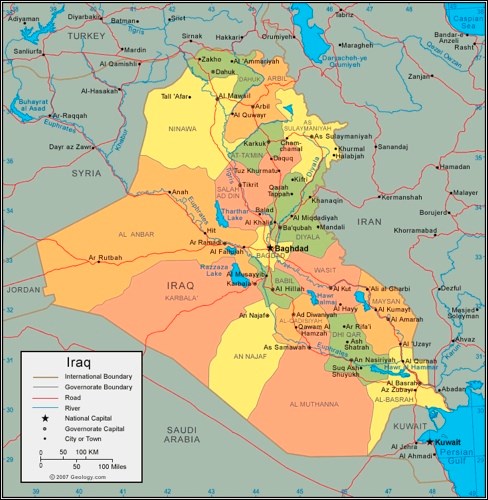My last interview with new immigrants focused on their experience in Canada and their adjustments to Canadian culture, weather and people. The picture of Canada that emerged was, I hope, ambiguous - a place with great prosperity and equality (compared to other parts of the world), but also a place which has in some ways lost its way. Each of the men I interviewed lamented how comparatively dull Canadian culture was, the way we as a culture treated our old people, and our wasteful practices.
A subsequent interview initiated by Carlos, who runs My Friend's Place in Battleford. His nephew came to Canada from Iraq less than two weeks earlier.
The interview didn't go as I'd expected. Hoping for a balanced, nuanced look at Canadian society and culture, I instead received glowing, impossibly happy adulation from Qusay, his wife Aala and his sister, Eveien.
This interview gives most readers a perspective of the U.S. invasion of Iraq that was mostly lost to the Western media, namely, the perspective of Iraqis. Though the invasion (as it was referred to by my interview subjects) received more media coverage than any other war in history, almost none of this coverage was based on the perspective of Iraqis.
The interview also gives a perspective of Canada that we don't often get. What was beautiful about the viewpoint of my interview subjects was, strangely, its na茂vet茅. They saw the good parts of our society and none of the bad ones. I will do a follow-up interview with them once they've lived through a Canadian winter, seen our homeless population and worked jobs. But for now, let this be a reminder of how great our society is right now in some important ways.
If you are a new immigrant and interested in sharing your story, you can contact me at [email protected].
As they just arrived in Canada, none of the three adults in the interview have yet found jobs. In Iraq, Qusay worked for an antibiotic company, his wife Alaa worked in the oil industry and Eveien was an accountant for a trade company. Qusay and Alaa have three children and Eveien has one daughter. Qusay's oldest son Omar, 11, participated in the interview and is currently studying at a school in Battleford.
Alex: Why did you decide to come to Canada?
Qusay: Because of our children's future. There is no future for children in Iraq
Alex: And why Canada specifically?
Qusay: My uncle is here, he supported me and helped me with my paperwork.
Alex: And the same answer for everyone else?
Alaa: Also because we know about Canada and the situation here, how people are respected.
Alex: And why did you come to Canada when you did?
Qusay: Because our immigration visa was only issued six or seven months ago. Once we had settled everything in Iraq, we came to Canada. We started the application process in 2007.
Alex: Why did you decide to leave Iraq in 2007?
Qusay: My uncle called me from Canada to tell me that there was an opportunity to come to Canada, take it or leave it. You will face problems because the weather's cold and you need to work, but there's opportunity for you and for your children especially.
Alex: What was the reaction when you found out that the United States was invading your country?
Qusay: There were different feelings. We didn't know what would happen. The invasion would end up destroying everything. It's the most powerful military in the world. One of the reports said that America couldn't lose the war. To us that meant that they would use everything to make sure they didn't lose. Some people were worried they would use nuclear weapons.
Alaa: I think the most powerful feeling was pain. That there were strangers with weapons and tanks and everything coming to your country and taking power there, and you can't walk in the street, you can't stay at home. My parents' house was checked by the Americans twice - they're just two old people. That was so painful. It's not something easy. You're used to living in freedom in your country, coming and going as you please, and now it's different. This is painful.
Eveien: Our parents' house caught fire in Baghdad because of the civil war.
Qusay: The occupation destroyed everything. We didn't have police, military, or a an intelligence organization. Everything became gang-related. Let's say that in Battleford, there are two or three gangs. In Baghdad in our quarter there are three or four gangs that fight each other. For what, we don't know.
Alex: Now for a more general question: how did the U.S. invasion change day-to-day life for Iraqis?
Qusay: Upside-down.
Alex: And what do you mean by that?Qusay: Well, I was settled, I felt secure, I had children who might have had a good future. After the invasion, I had nothing.
Alaa: In Iraq after the occupation, most of the people left, especially the educated ones. Now when you hear about the colleges and high schools in Iraq, there are no educated people working there. No good doctors, no good engineers, the construction business was destroyed, there was no construction at all. So when you see the situation around you, you know that there is no future. What school is your child going to go to, what will he learn? This is the situation for all of Iraq. Some people with money or the opportunity to leave Iraq left, because they were thinking of their future. But most of the people stayed in Iraq because they had no opportunity. So they kept living there during everything.
Ignorant people have power in Iraq, and when ignorant people have power in Iraq, what can they do? Nothing.
Next week I'll present the conclusion of the interview in which the newly transplanted Iraqis will begin by describing their initial impressions of Canada.




